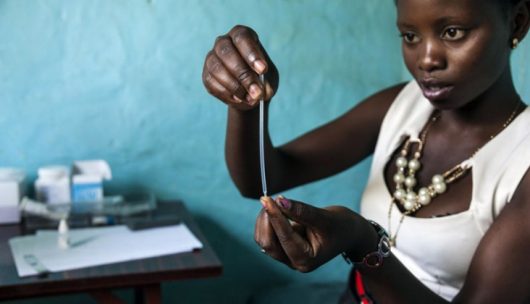New HIV Prevention Methods for Sub-Saharan Young Women
 Nearly 1,000 sub-Saharan young women are infected with HIV every day. Women accounted for more than half of the 25.8 million people living with HIV in 2014.
Nearly 1,000 sub-Saharan young women are infected with HIV every day. Women accounted for more than half of the 25.8 million people living with HIV in 2014.
From 2012 to 2015, more than 4,500 women participated in two distinct open-label studies designed to test a new HIV prevention method. ASPIRE was designed to determine if dapivirine, an experimental antiretroviral drug, could safely and effectively prevent HIV infection. The International Partnership for Microbicides (IPM) developed the dapivirine silicone vaginal ring. Each ring carries 25 mg of dapivirine and slowly releases the drug over a period of time.
The ASPIRE test was conducted at 15 sites in Malawi, South Africa, Uganda and Zimbabwe where 2,629 women enrolled to participate. ASPIRE’s sister study, The Ring Study, enrolled 1,959 women aged 18 to 45 in six sites in South Africa and one site in Uganda. Data revealed that when consistently released and replaced every four weeks, the dapivirine ring reduced the risk of acquiring HIV by 37 percent.
In women 25 years and older it reduced the risk of infection by 61 percent. Although more successful than anticipated, analysis found that sub-Saharan young women appeared to use the ring less consistently than older participants.
ASPIRE’s follow-on trial, HIV Open-Label Extension (HOPE) is currently under way. It is designed to determine how the ring could fit into women’s lives, any relationships between adherence and HIV protection, and why dapivirine will work for some women and not others.
Last but not least is the USAID-funded Determined, Resilient, Empowered, AIDS-free, Mentored and Safe (DREAMS) Initiative. DREAMS is set to reduce HIV infection in women ages 15 to 28 in Kenya, Lesotho, Malawi, Mozambique, South Africa, Swaziland, Tanzania, Uganda, Zambia and Zimbabwe. By the end of 2017, DREAMS will achieve a 40 percent reduction in HIV incidence among adolescent girls and young women.
In addition to providing sub-Saharan young women with the new HIV prevention method, DREAMS will provide HIV counseling and testing, education subsidies, post-violence care, access to youth-friendly sexual and reproductive health services and parenting and caregiver programs.
With the continued development and implementation of programs like these, young women in sub-Saharan Africa will be able to live empowered, independent lives free from disease and with opportunities for prosperity.
– Tiffany Santos
